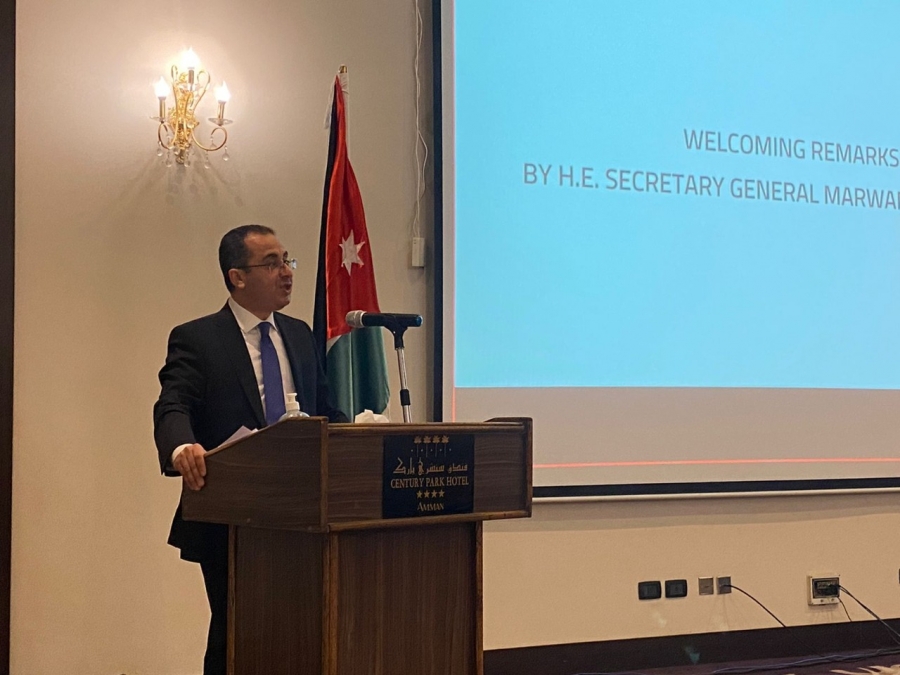- International News
- Web-2021-11-17 | 11:13 am

Nayrouz News Agency :
Amman – Wednesday (November 10) As part of the coordination and consultation with our stakeholders, the Secretary General of the Ministry of Planning and International Cooperation, His Excellency Marwan Al-Refai, met with representatives of the international community, during the Technical Donors Meeting on the updated Reform Matrix, where representatives from donors, embassies and international financing institutions such as the World Bank and European Bank for Construction and Development participated in the meeting. The main objective of the meeting was to present the updated Reform Matrix, the main features of the mid-term review led by the Reform Secretariat at MoPIC which included climate change and environmental mainstreaming across the Reform Matrix, and linkages to the Government Priorities Program.
H.E. Marwan Al - Refai, commended on the donors’ support in implementing many of the reforms within the Reform Matrix that have been achieved to date through the Reform Support Fund, and stressed that the Reform Matrix, launched at the Jordan Growth and Opportunity – The London Initiative which took place in London back in February 2019, is more important and relevant than ever before. Not only due to the impacts of the pandemic, which fuelled the need to expedite the reform process, but also because it sets the grounds for all the Government’s strategic direction, represented in its Indicative Executive Plan, and the recently announced Priorities plan. Furthermore, the Reform Matrix is the guiding source for many international and bilateral arrangements, including those with the IMF, the World Bank, and many of partner countries represented here today.
The Reform Secretariat team at MoPIC presented the updated Reform Matrix and the results of the mid-term review process and consultations with the government and the private sector, including adding the tourism sector pillar and highlighting some importance pillars such as the agriculture, water and enhancing public sector efficiency and governance. Furthermore, the team presented briefly a set of most important reforms that have been achieved since 2018, including enacting a law on regulating the general budget and the budget of government unites, enact Public-Private Partnership law and bylaws, adopting and implementing the ISIC4 classification framework, issuance of the nursery licensing bylaw in 2019 followed by the issuance of Home-based childcare licensing instruction in 2021, endorsing and launching the National Social Protection Strategy (2019 - 2025), establishment of the Tourism Resilience Fund, approval of adoption of integrated National Intelligent Transport System, launch of energy storage and e-mobility assessments, continued implementation of energy efficiency and renewable energy water optimization projects and the launch of Food Security Strategy.
In addition, during the meeting, the Reform Secretariat team discussed how they mainstreamed and integrated the climate change and environment aspect across the Reform Matrix to enhance Jordan's efforts in the transition to a green economy responsive to climate change and support the government in attracting climate finance.
The meeting included interventions from representatives of the international community representatives on the updated Reform Matrix. At the end of the meeting, the attendees agreed on the importance of the continues partnership between the international community and the government and the need to work on structuring the partnership through the formation of technical working groups to achieve better results.
It is noteworthy that the Reform Matrix includes a set of priority and structural reforms over five years, aimed at macroeconomic stability, public sector efficiency and governance, improving the business environment and competitiveness of the private sector, increasing exports and the flow of foreign direct investment. facilitating access to finance, raising the efficiency of the labor market and increasing its flexibility, and improving and expanding the social safety net. In addition to four vertical pillars focus on policy reform in the transport, energy, water and agricultural sectors, and the tourism sector.
To follow up on the progress and oversee the implementation of the Reform Matrix, the Reform secretariat was established at the MoPIC late 2019, which also provides the necessary technical assistance to the GoJ line agencies to facilitate the implementation of the reforms. Also, the Reform Secretariat communicates and consults with the relevant stakeholders on a regular basis in order to prioritize economic reforms and prepare periodic reports on the progress of the implementing the reforms.













